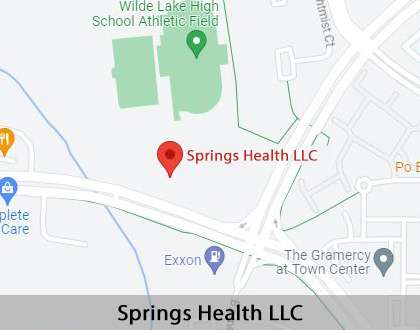Psychotherapy Treatment Columbia, MD
Psychotherapy treatment addresses mental distress through talk therapy, used to help people eliminate or control troubling symptoms and respond to stressful situations with healthy coping skills. Millions of Americans struggle with mental health or emotional difficulties brought on by a host of life challenges. Psychotherapy treatment can help address those challenges.
Psychotherapy may be combined with medication or other therapies. Psychotherapy treatment is available at Springs Health LLC in Columbia. If you are struggling emotionally, do not wait. Call us at (410) 772-0774 to learn more or make an appointment.
Psychotherapy Explained
Psychotherapy is when a person utilizes the expertise of a therapist to work through mental health or emotional problems. The therapist creates a supportive environment that encourages patients to talk openly about their thoughts, feelings, and experiences. Therapists and patients collaborate to identify thoughts and behaviors that are keeping them from feeling well before recommending healthy changes.
To get the most out of treatment, patients will want to feel comfortable with the therapist. Together, the patient and therapist can set objectives and measure progress over time. For example, a patient’s goals for psychotherapy treatment should be to get to know themself better, alleviate emotional pain, better understand their mental health issues, and develop more effective coping skills.
“Psychotherapy is when a person utilizes the expertise of a therapist to work through mental health or emotional problems.”
The Benefits of Psychotherapy
Psychotherapy has been shown to improve emotions and behaviors and can significantly enhance a person’s quality of life. The American Psychological Association reports about 75% of people who utilize psychotherapy show some benefit. Psychotherapy treatment can boost motivation, self-esteem, and overall mental health.
People should seek out psychotherapy if they have been diagnosed with any number of mental health conditions, including:
- Anxiety disorders such as obsessive-compulsive disorder
- Depression
- Substance use disorders
- Eating disorders
- Psychotic disorders such as schizophrenia
Not everyone who seeks out psychotherapy does so for help with a diagnosed mental illness. It can also help people manage the stress and conflicts that come from daily life, such as:
- Work stress or anxiety
- Relationship conflicts
- Major life changes such as divorce or job loss
- Unhealthy reactions to situations, such as road rage
- Chronic health issues
- Sexual problems
- Insomnia
Psychotherapy treatment brings with it very few risks. The patient may feel a bit emotionally vulnerable at times. However, our skilled therapist will work with them to meet their needs and guide them toward a better quality of life.
“Psychotherapy has been shown to improve emotions and behaviors and can significantly enhance a person’s quality of life.”
The First Consultation
It is important to understand that psychotherapy does not provide an instant solution. It usually requires multiple visits to fully understand a patient’s unique situation and needs. During the first consultation, the therapist may ask what brought the patient to therapy and about any specific symptoms they are experiencing. The patient may also have to fill out a few forms detailing their past and present health history.
The patient should make sure they understand the types of psychotherapy, the goals of treatment, the session lengths, and how many sessions the therapist thinks the patient may need. Do not hesitate to ask questions. The first session is also a chance for the patient to get to know the therapist and better understand their approach.
“During the first consultation, the therapist may ask what brought the patient to therapy and about any specific symptoms they are experiencing.”
Check out what others are saying about our mental wellness on Yelp: Psychotherapy Treatment in Columbia, MD
The Session Process
Patients typically see their therapist once or twice a week to start. It can be short-term with just a few sessions to address an immediate issue or long-term to work on more complex concerns. The session length and frequency depend on the patient’s specific diagnosis or situation, how severe the symptoms are, how long they have been in their particular situation, and how quickly they progress.
As the patient continues through the process, they will work with the therapist to find new ways of thinking, behaving, and managing feelings. The patient may role-play new behaviors during a session or two and get homework assignments to practice between sessions. The therapist will continue to assess the patient’s progress, work to reinforce what they have learned, and hopefully leave them feeling more positive about their future. Psychotherapy should provide patients with the tools to increase awareness, compassion, and understanding toward themselves and others.
“As patients work through the process, they will work with our therapist to find new ways of thinking, behaving, and managing their feelings.”
Questions Answered on This Page
Q. What are the benefits of psychotherapy?
Q. What is the first psychotherapy consultation like?
Q. What is the goal of multiple psychotherapy sessions?
Q. How can I incorporate psychotherapy into my daily routine?
People Also Ask
Q. How can I find the right psychiatrist?
Incorporating Psychotherapy into Daily Life
Psychotherapy treatment may not necessarily cure a condition, but it can help develop healthy coping skills one can use every day. Many people report improved mental health long after therapy has ended. The patient’s new skills will help them see themself and the world differently. That all leads to a new, mentally healthy lifestyle.
Through psychotherapy, patients have learned resilience to help them better cope with future challenges. Their mind is clearer, making it easier to focus on work, school, and relationships. Psychotherapy treatment increases productivity by helping patients prioritize and develop the skills to manage their time better. Patients learn self-confidence, how to clarify values and set boundaries, and communicate more effectively.
“Psychotherapy treatment may not necessarily cure a condition, but it can help develop healthy coping skills one can use every day.”
Frequently Asked Questions
Q. How does psychotherapy help you?
A. Psychotherapy has been shown to significantly improve a person’s quality of life. Therapists provide support, problem-solving skills, and coping strategies for issues ranging from depression to body image. Others find psychotherapy helpful when dealing with family stress, grief, or interpersonal relationships.
Q. How often should I see a therapist?
A. Most people go once a week, but the frequency can vary depending on the needs addressed. It can be short-term to address a specific concern or last for months or years to deal with more difficult issues. You and your therapist will discuss your individual goals.
Q. What happens in a psychotherapy session?
A. Each session will examine what has happened with the patient since the previous meeting and address any successes or difficulties. You will likely discuss what is currently happening in your life and report on any additional progress. Often patients are given homework to complete in between sessions to practice any new skills they have learned.
Q. Why can I not just take medication?
A. Research has shown that medication alone is often not enough to treat mental and emotional problems long-term. Psychotherapy addresses the actual cause of the distress and works to change behavior patterns. Sometimes a combination of medication and psychotherapy is the right treatment option.
Q. How do I go about finding a psychotherapist?
A. If you have health insurance, they can often provide a list of psychotherapists on your plan. You can use that list to research them on the internet. Of course, family and friends are always excellent sources of referrals, and some people even turn to their primary care provider. States and counties typically provide mental health assistance to individuals who are low-income or without insurance.
Change Is Possible – Call Us Today
Life isn't always easy. Are you struggling? Are you looking for a highly personalized and professional approach tailored to your individual needs? Instead of waiting around, call us today. You should know that there is hope for a better tomorrow.
Definitions
Learn More About Psychotherapy Treatment
If you are struggling with mental health or any one of life’s many stresses, psychotherapy treatment can provide the help necessary to live a happier, healthier life. To learn more about psychotherapy treatment, call us at 410-772-0774 and schedule an appointment. It is not a quick fix, but it can be a powerful tool to help you improve your mental health.
Helpful Related Links
- Agency for Healthcare Research and Quality. Agency for Healthcare Research and Quality. 2023
- American Psychiatric Association (APA). American Psychiatric Association (APA). 2023
- Psychology Today. Psychology Today. 2023
- The American Board of Professional Psychology. The American Board of Professional Psychology. 2023
- The American Journal of Psychology. The American Journal of Psychology. 2023
- The National Association of Behavioral Healthcare. The National Association of Behavioral Healthcare. 2023
About our business and website security
- Springs Health LLC was established in 2021.
- We accept the following payment methods: American Express, Cash, Discover, MasterCard, and Visa
- We serve patients from the following counties: Howard County
- We serve patients from the following cities: Columbia, Clarksville, North Laurel, Ellicott City, and Savage
- National Provider Identifier Database (1689198350). View NPI Registry Information
- Norton Safe Web. View Details
- Trend Micro Site Safety Center. View Details
Back to top of Psychotherapy Treatment








